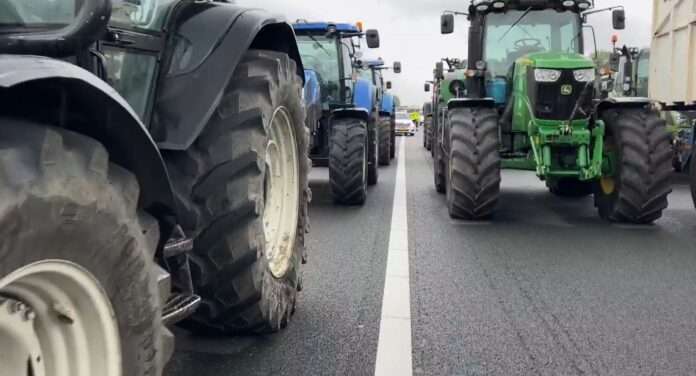Farmers tried to reach Eindhoven Airport on Tuesday evening, to demonstrate there. The police eventually managed to prevent this.
The police and the Koninklijke Marechaussee (Netherlands royal military constabulary) closed off the access roads to the airport. This made it impossible for tractors to pass through, and the farmers turned around.
There are farmers’ protests in many places this week. On Monday, for instance, the region was hit by major traffic jams due to blockades on the motorways.
The farmers are protesting against the nitrogen measures and other policies* of the government. Farm animals emit nitrogen and when this is too much it has harmful consequences for people and nature. The government thinks the number of livestock in the country must therefore be reduced. Something that many farmers disagree with.
Source: Studio040
Translated by: Bob
*
1. Expropriation of farmers
Farmers close to nitrogen-sensitive nature areas will have to leave according to the proposed nitrogen policy.
2. Rural society destruction
The disappearance of many farms (and as a result medium-sized enterprises (SMEs) and other (educational and cultural) organisations) in areas with a substantial objective means the local economy and rural life is being wiped out.
3. No perspective for the future
Despite promises, there is no future perspective for farmers from The Hague policies. Extensification means more costs or less income. This puts farmers at a competitive disadvantage compared to other European farmers operating in the same market.
4. Taxpayer pays 3 times
Dutch citizens will pay three times for the nitrogen plans of the government. The cabinet wants to spend 25 billion euros on mainly buying up agricultural companies, while innovation is much cheaper. A smaller agricultural sector means less tax income that has to come from elsewhere. Areas have to be redeveloped and maintained, which means more governmental costs.
5. KDW standards and Aerius measuring not adequate
The Critical Deposition Value (KDW) is not practical nor feasible as an instrument to protect nature in the Netherlands. Even if all farmers were to disappear, the KDW would not be met in a number of areas.
Aerius, the nitrogen model used to calculate nitrogen deposition, is unreliable and thus unsuitable for policy at local level. This is what the Hordijk Commission stated.
6. Farmers are treated unequally
Compared to other sectors. Much damage is attributed to the agricultural sector while there is a disproportionate expectation of other poluting sectors. For example, industry, electricity, construction, aviation and mobility.
7. No room for alternatives
The agricultural sector has made many proposals to reduce nitrogen, short and long term. These have not been adopted by the government. There is little room for technical innovations, as is allowed in other branches. Farmers therefore feel that they are not taken seriously and are treated unequally.
8. Top-down approach
The area-oriented approach sounds like a bottom-up process, but because of the high reduction targets it is a top-down approach with the threat of expropriation.
9. More environmental impact
By reducing food production in the Netherlands, more will have to be produced elsewhere. Because Dutch agriculture is high-tech, strict and very efficient, this will lead to more harmful output elsewhere.
10. Nature management fails
Over the past few decades, governments and nature organisations have created many new nature areas. Many areas are not managed in the way they were created and are affected by climate change. There is lack of openness about nature data, farmers feel sacrificed for failing nature management.
















